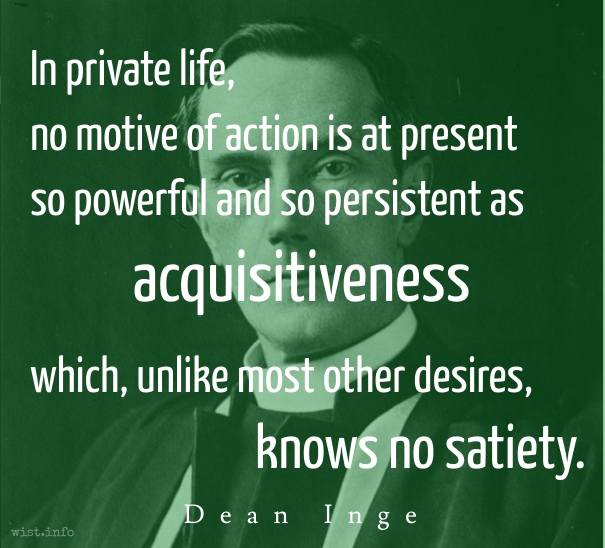It is an insanity to get more than you want. Imagine a man in this city, an intelligent man, say with two or three millions of coats, eight or ten millions of hats, vast warehouses full of shoes, billions of neckties, and imagine that man getting up at four o’clock in the morning, in the rain and snow and sleet, working like a dog all day to get another necktie! Is not that exactly what the man of twenty or thirty millions, or of five millions, does to-day? Wearing his life out that somebody may say, “How rich he is!”
Robert Green Ingersoll (1833-1899) American lawyer, freethinker, orator
Speech (1886-11-14), “A Lay Sermon,” American Secular Union annual congress, Chickering Hall, New York City
(Source)
Quotations about:
acquisition
Note not all quotations have been tagged, so Search may find additional quotes on this topic.
There nothing so sacred that money cannot corrupt it, and nothing so well defended that money cannot over throw it.
[Nihil esse tam sanctum quod non violari, nihil tam munitum quod non expugnari pecunia possit.]
Marcus Tullius Cicero (106-43 BC) Roman orator, statesman, philosopher
In Verrem [Against Verres; Verrine Orations], Action 1, ch. 2 / sec. 4 (1.2.4) (70 BC) [tr. Berry (2006)]
(Source)
Boast by Caius Verres (or so Cicero alleges).
Various translations vary as to whether this is 1.2.4 (which I have chosen) or 1.1.4 (as noted).
(Source (Latin)). Alternate translations:Nothing is so holy that it cannot be corrupted, or so strongly fortified that it cannot be stormed by money.
[tr. Yonge (1903), 1.1.4]No sanctuary is too holy for money to defile it, no fortress too strong for money to capture it.
[tr. Greenwood (1928)]Nothing, he declares, is too sacred to be corrupted by money; nothing too strong to resist its attack.
[tr. Grant (1960)]There is nothing so sacred that it cannot be sullied, nor anything so protected that it cannot be overcome by money.
[tr. @sententiq (2017), 1.1.4]There is no sanctuary so holy that money cannot profane it, no fortress so strong that money cannot take it by storm.
[Source]
In truth, it is not want, but rather abundance, that breeds avarice.
[De vray, ce n’est pas la disette, c’est plustost l’abondance qui produict l’avarice.]
Michel de Montaigne (1533-1592) French essayist
Essays, Book 1, ch. 14 (1.14), “The Taste of Good and Bad Things Depends Mostly on the Opinion We Have of Them [Que le goust des biens et des maux despend en bonne partie de l’opinion que nous en avons]” (1572) [tr. Frame (1943)]
(Source)
Though this chapter was written around 1572 for the 1580 edition, this text was added for the 1588 edition. The chapter as a whole was numbered ch. 14 in the 1580 and 1588 editions, moved to ch. 40 for the 1595 ed. Most modern translations use the original numbering.
(Source (French)). Alternate translations:Verily, it is not want, but rather plenty that causeth avarice.
[tr. Florio (1603), ch. 40]In plain truth, it is not Want, but rather Abundance, that Creates Avarice.
[tr. Cotton (1686), ch. 40]In truth, it is not want, but rather abundance, that creates avarice.
[tr. Cotton/Hazlitt (1877), ch. 40]In truth, it is not want, but rather abundance, which gives birth to avarice.
[tr. Ives (1925)]And truly it is not want that produces avarice but plenty.
[tr. Screech (1987)]Truly, abundance rather than want causes stinginess.
[tr. HyperEssays (2023)]
More businesses die of indigestion than starvation.
David Packard (1912-1996) American electrical engineer, businessman, government official
(Misattributed)
The quote is frequently attributed to Packard, but actually he (anonymously) quoted in his book, The HP Way: How Bill Hewlett and I Built Our Company (1995): "Wells Fargo sent a retired engineer to visit us. I spent a full afternoon with him and I have remembered ever since some advice he gave me. He said that more businesses die of indigestion than starvation. I have observed the truth of that advice many times since then."
Variants of the saying include "entrepreneurs," "companies," and "start-ups" in place of "businesses." See here for more information.
It is not merely that the ownership of any substantial share in the national wealth is concentrated to-day in the hands of a few hundred thousand families, and that at the end of an age which began with an affirmation of the rights of property, proprietary rights are, in fact, far from being widely distributed. Nor is it merely that what makes property insecure to-day is not the arbitrary taxation of unconstitutional monarchies or the privileges of an idle noblesse, but the insatiable expansion and aggregation of property itself, which menaces with absorption all property less than the greatest, the small master, the little shopkeeper, the country bank, and has turned the mass of mankind into a proletariat working under the agents and for the profit of those who own.
Munny will buy a pretty good dog, but it wont buy the wag ov hiz tale.
[Money will buy a pretty good dog, but it won’t buy the wag of his tail.]
Josh Billings (1818-1885) American humorist, aphorist [pseud. of Henry Wheeler Shaw]
Josh Billings’ Trump Kards, ch. 14 “A Ghost” (1874)
(Source)
Most people seek after what they do not possess and thus are enslaved by the very things they want to acquire. They become prisoners of their desires even though they appear to be free.










